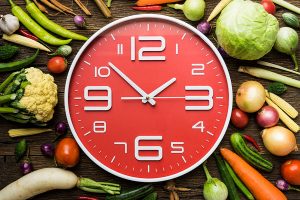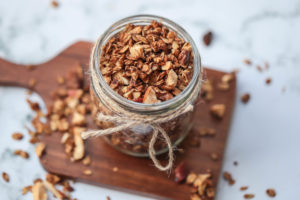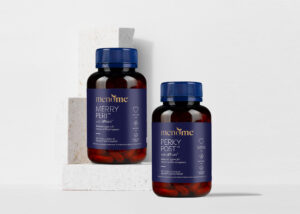Most Popular Posts

3000-Year-Old Ayurvedic Tips To Ease You Through Menopause
If you’re looking for natural menopause relief to ease you through menopause there’s a lot on offer. From natural supplementation like 40+ and 55+ through to the ancient wisdom of Ayurveda. As a matter of fact, it’s a good idea

5 Ways Your Diet Should Change As You Enter Perimenopause
Fact. Food is pivotal to your menopausal journey. Regular readers will know perimenopause (peri) – or the several years leading up to menopause – is all-important to our entire menopause experience. Perimenopause usually occurs during our 40s. It’s a time

Recipe: Linda Kearns HRT Cake
HRT Cake? HRT or menopause cake is something I’d never heard of until recently. But, it seems, back in the ‘90s, a woman called Linda Kearns created a cake to help women through menopause naturally. And the women of the

Discover 9 Amazing Benefits of Intermittent Fasting
As we all know one of the bugbears of the ‘meno’ years is weight gain. To be clear, in this context, the ‘meno‘ years means perimenopause, menopause and post-menopause. Indeed, it’s something to be aware of as early as premenopause

Women Like Us Share Their Personal Story Of Menopause: Jackie
Real Stories of Menopause In our Women Like Us – Real Stories Of Menopause series, we caught up with Jackie Adam to talk about what menopause feels like for her. Thanks for taking part in Women Like Us – Real

Recommended Books: What We’re Reading (and how it helps us understand change)
When you’re learning about peri- and post-menopause some of your BFF’s are recommended books about menopause. The truth is not so long ago you would have been hard-pressed to find a good list of recommended books about menopause. Lucky for

Women Like Us Share Their Personal Story Of Menopause: Juliet
Welcome to ‘real stories’ where Juliet is sharing her personal story of menopause. Australian-based Juliet is 51 and we’ve been supporting her for about 18 months or so. She’s delighted to share her story with you but not her photograph.

Recipe: Delicious Menopause-Friendly Apple, Cinnamon & Walnut Granola
Mmm! This menopause-friendly granola is crunchy and delicious and lends a special treat time to breaking your fast aka breakfast. Or, you could choose to have it as a snack treat. What makes it a waistline & menopause-friendly granola? It’s

Women Like Us Share Personal Stories Of Menopause: Rebecca & Lyndal
In our Women Like Us – Personal Stories Of Menopause series, Rebecca* and Lyndal* filled out our Q&A form and shared what menopause has meant for them. Rebecca’s* personal story of menopause MM: When did you first realise perimenopause had

Your Second Spring | 7 Smart Ways To Manage Menopause 🌱
As we head into spring we’re looking to the beautiful Chinese term for menopause – your second spring. Indeed, the Chinese look at our second spring differently. They view it as a time to work with nature to find the

Queen Menopause, Finding Majesty In The Mayhem With Alison Daddo
Alison Brahe Daddo – or Ali as she is commonly called – was only 16 when she burst onto the Australian modelling scene in the mid-80’s.
Many of us, in both Australia and New Zealand, grew up seeing her gorgeous

What You Need To Know About Merry Peri™, Perky Post™ & affron®
Please take a bow, Merry Peri™ and Perky Post™. It’s so good to see you! To explain, we went on an information-gathering journey to find some wonderful, natural ingredients for menopause support. As a result, Merry Peri™ and Perky Post™






